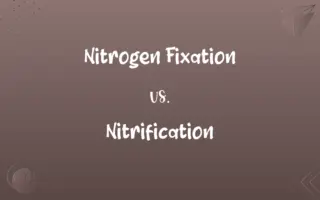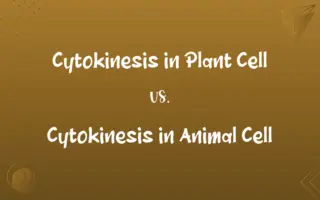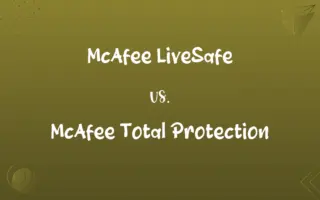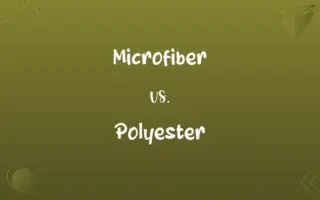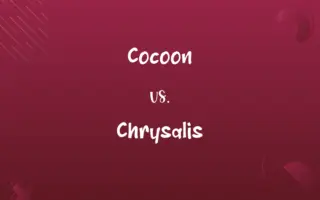Gel Filtration vs. Affinity Chromatography: Know the Difference

By Shumaila Saeed || Updated on December 26, 2023
Gel Filtration separates molecules by size using a porous gel. Affinity Chromatography isolates specific molecules based on their binding affinity.
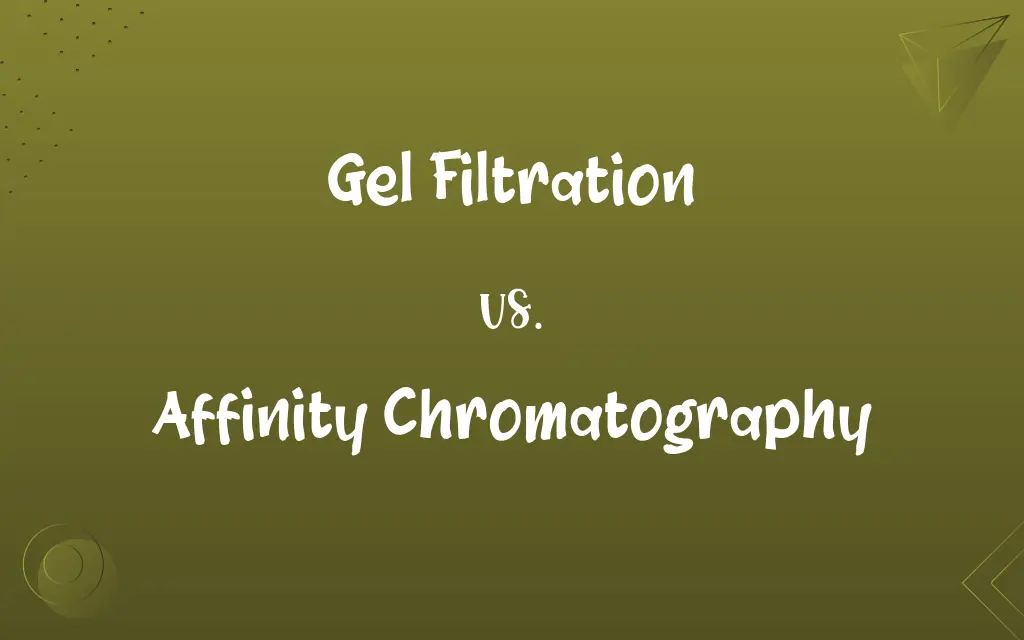
Key Differences
Gel Filtration, also known as size-exclusion chromatography, is a method used to separate molecules based on their size. It utilizes a column filled with porous gel beads, allowing smaller molecules to enter the pores and travel more slowly than larger molecules, which pass through the column more quickly. This method is useful for purifying proteins, analyzing molecular sizes, and separating biomolecules.
Shumaila Saeed
Dec 24, 2023
Affinity Chromatography, in contrast, is a technique that isolates molecules based on specific binding interactions between an immobilized ligand in the column and target molecules in the sample. The binding affinity between the ligand and the target molecule ensures a highly selective separation. This method is widely used for purifying and concentrating specific proteins or nucleic acids from complex mixtures.
Shumaila Saeed
Dec 24, 2023
In Gel Filtration, the separation is solely based on molecular size, without any consideration for the chemical properties or biological function of the molecules. This technique is particularly valuable when preserving the native state of the molecules is essential, as it does not require harsh conditions or specific binding interactions.
Shumaila Saeed
Dec 24, 2023
Affinity Chromatography, however, relies heavily on the biological function or chemical properties of the molecules for separation. The specific interaction between the target molecule and the ligand, such as an antibody-antigen or enzyme-substrate interaction, makes it a powerful tool for studying biological processes and for applications in biotechnology and medicine.
Shumaila Saeed
Dec 24, 2023
Gel Filtration is generally less specific compared to Affinity Chromatography. While it provides good resolution based on size, it cannot distinguish between molecules of similar sizes with different biological functions. On the other hand, Affinity Chromatography offers high specificity, enabling the isolation of a single type of molecule from a complex mixture, making it indispensable for purifying specific proteins or other biologically active molecules.
Shumaila Saeed
Dec 24, 2023
ADVERTISEMENT
Comparison Chart
Applications
Size analysis, biomolecule separation
Purifying specific proteins or nucleic acids
Shumaila Saeed
Dec 24, 2023
Use in Biological Studies
Limited to size-related studies
Extensive for functional studies
Shumaila Saeed
Dec 24, 2023
ADVERTISEMENT
Gel Filtration and Affinity Chromatography Definitions
Gel Filtration
Gel Filtration is a chromatographic method to separate molecules based on size.
Gel filtration was used to separate enzymes based on their molecular weight.
Shumaila Saeed
Dec 14, 2023
Affinity Chromatography
A technique utilizing binding affinity between a ligand and target for separation.
Enzyme purification was achieved efficiently through affinity chromatography.
Shumaila Saeed
Dec 14, 2023
Gel Filtration
A process for purifying proteins by passing them through a gel matrix.
Gel filtration proved effective in isolating large proteins from a cellular extract.
Shumaila Saeed
Dec 14, 2023
Affinity Chromatography
A method for separating biochemical mixtures based on a highly specific interaction.
The lab employed affinity chromatography to isolate receptor proteins.
Shumaila Saeed
Dec 14, 2023
Gel Filtration
A technique where molecules are separated in a column filled with porous beads.
The lab utilized gel filtration to analyze the size distribution of polymer chains.
Shumaila Saeed
Dec 14, 2023
ADVERTISEMENT
Affinity Chromatography
A technique for purifying and concentrating specific molecules from a mixture.
Scientists used affinity chromatography for the selective isolation of nucleic acids.
Shumaila Saeed
Dec 14, 2023
Gel Filtration
A chromatography method differentiating molecules by their rate of travel through a gel.
Researchers applied gel filtration to study the oligomeric state of a protein.
Shumaila Saeed
Dec 14, 2023
Affinity Chromatography
Affinity Chromatography isolates molecules using specific binding interactions.
Affinity chromatography was used to purify antibodies from a complex mixture.
Shumaila Saeed
Dec 14, 2023
Gel Filtration
A laboratory technique separating compounds based on molecular size exclusion.
Gel filtration was integral in purifying antibodies from a serum sample.
Shumaila Saeed
Dec 14, 2023
Affinity Chromatography
A chromatographic process where target molecules bind to a specific ligand.
Affinity chromatography was crucial in the study of protein-DNA interactions.
Shumaila Saeed
Dec 14, 2023
Repeatedly Asked Queries
Is Affinity Chromatography suitable for purifying enzymes?
Yes, especially if a specific ligand for the enzyme is available.
Shumaila Saeed
Dec 24, 2023
How does Affinity Chromatography work?
It uses specific binding interactions between a ligand and target molecules for separation.
Shumaila Saeed
Dec 24, 2023
Can Gel Filtration separate proteins of similar sizes?
It has limitations in separating proteins with minor size differences.
Shumaila Saeed
Dec 24, 2023
What is Gel Filtration?
It's a chromatography technique for separating molecules based on size.
Shumaila Saeed
Dec 24, 2023
What's the main use of Gel Filtration?
It's primarily used for size analysis and separating biomolecules.
Shumaila Saeed
Dec 24, 2023
Are there limitations to Affinity Chromatography?
Its effectiveness depends on the availability and specificity of ligands.
Shumaila Saeed
Dec 24, 2023
What samples can be used in Gel Filtration?
A wide range, from proteins to polymers.
Shumaila Saeed
Dec 24, 2023
Can Affinity Chromatography concentrate samples?
Yes, it's effective in concentrating specific target molecules.
Shumaila Saeed
Dec 24, 2023
What is the principle behind Gel Filtration?
Separation is based on the differential exclusion of molecules by a porous matrix.
Shumaila Saeed
Dec 24, 2023
Does Gel Filtration require special buffers?
No, it's compatible with a variety of buffers.
Shumaila Saeed
Dec 24, 2023
Is Affinity Chromatography cost-effective?
It can be, but the cost depends on the ligand and scale of the operation.
Shumaila Saeed
Dec 24, 2023
Can Gel Filtration be used for DNA separation?
Yes, for separating DNA fragments based on size.
Shumaila Saeed
Dec 24, 2023
What makes Affinity Chromatography unique?
Its high specificity and ability to isolate specific molecules.
Shumaila Saeed
Dec 24, 2023
Is Gel Filtration good for protein purification?
Yes, but it doesn't differentiate based on protein function.
Shumaila Saeed
Dec 24, 2023
Can Affinity Chromatography be used in drug development?
Absolutely, for identifying and purifying potential drug targets.
Shumaila Saeed
Dec 24, 2023
Is Gel Filtration suitable for all molecule types?
It's best for molecules with significant size differences.
Shumaila Saeed
Dec 24, 2023
What are the typical ligands used in Affinity Chromatography?
Antibodies, enzymes, and receptor proteins are common.
Shumaila Saeed
Dec 24, 2023
How fast is Gel Filtration?
It's relatively fast but depends on the column and sample size.
Shumaila Saeed
Dec 24, 2023
How specific is Affinity Chromatography?
Highly specific, targeting unique molecular interactions.
Shumaila Saeed
Dec 24, 2023
Can Affinity Chromatography be automated?
Yes, there are automated systems for high-throughput applications.
Shumaila Saeed
Dec 24, 2023
Share this page
Link for your blog / website
HTML
Link to share via messenger
About Author
Written by
Shumaila SaeedShumaila Saeed, an expert content creator with 6 years of experience, specializes in distilling complex topics into easily digestible comparisons, shining a light on the nuances that both inform and educate readers with clarity and accuracy.
